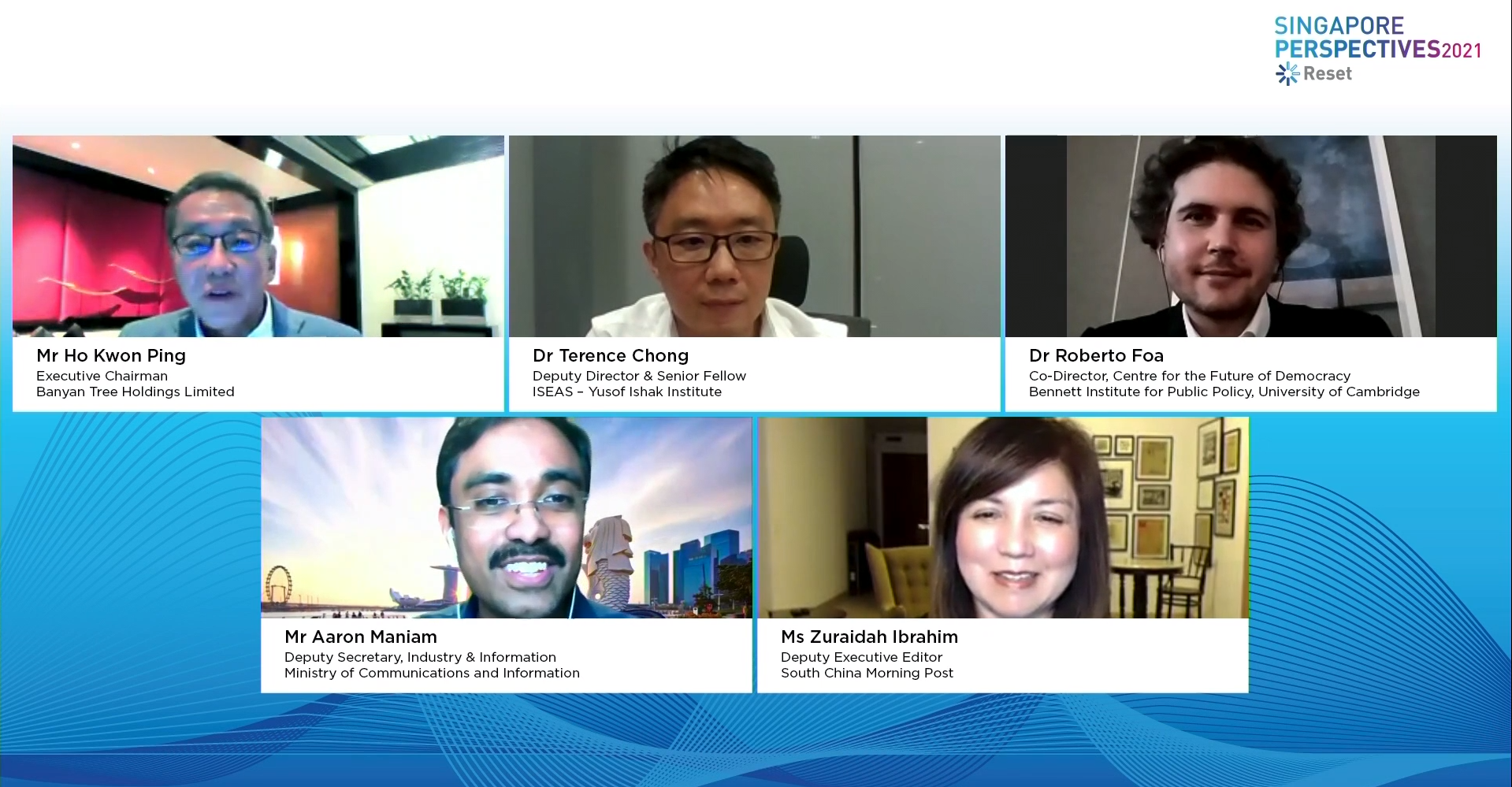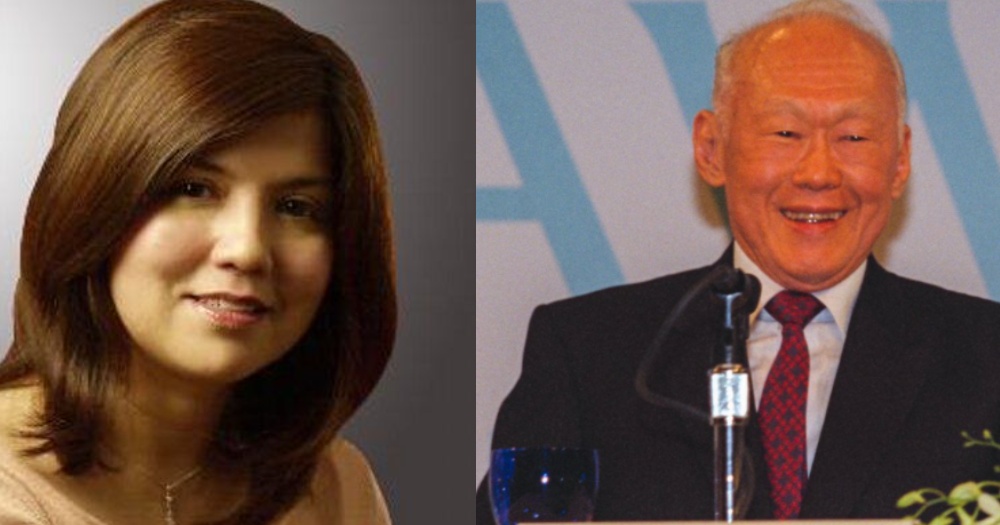What would democracy look like in the age of social media and influencers, and if the late Lee Kuan Yew was still alive, what would his social media persona be like?
This was one of many questions discussed by a group of prominent panelists, in the last of a series of nine online forums at the annual Singapore Perspectives forum, organised by the Institute of Policy Studies (IPS), on Tuesday (Jan. 19).
The session, which was on the topic of Global Trends, Social Movements and Democracy, was moderated by Ho Kwon Ping, founder and Executive Chairman of Banyan Tree Holdings.
Social media allows politicians to connect to their voters
In response to the question on social media and politics in Singapore, Zuraidah Ibrahim, who is the Deputy Executive Editor of South China Morning Post, said that it is natural for politicians to embrace social media, in order to appeal to as many voters as possible.
"If I were a politician, I would want to conquer as many platforms as possible, right? I want to get the votes, I want to be as popular as possible without being populist necessarily," she said.
Using social media allows politicians to connect to their voters, said Zuraidah, and ensure that they remain as accessible as possible.
Along the way, this would mean that politicians will have to allow more insight into their private lives, in return for appearing more human and vulnerable.
She also added that social media is likely here to stay, and that it is important for politicians to have the discipline to share, but not overshare, about their lives.
According to Zuraidah, she believes that Singapore politicians have largely utilised social media well in the last five years, "appearing more human" than they did in the past two decades.
"I would imagine if Lee Kuan Yew was around here, and if he had social media, I don't know, maybe he would have been feared, but also loved," quipped Zuraidah.
At this point, Ho could not help but give a quip of his own.
"Lee Kuan Yew in a tweet. That would be amazing," said Ho, eliciting a brief moment of laughter from the rest of the panelists.
 Image via IPS livestream.
Image via IPS livestream.
Politicians using social media must be authentic
On the same topic, Aaron Maniam, who is the deputy secretary at the Ministry of Communications and Information (MCI), said that in a healthy democracy, leaders must have a certain set of values and responsibility while using social media, knowing that the information they disseminate can spread at "large and unprecedented levels".
He said that the public needed to become more "literate consumers" of information, particularly in an age where information found on social media can easily be made up, or fake.
Maniam stressed the importance of having both the producers and consumers of information to be more literate than before, especially in the age of social media.
Terence Chong, Deputy Director and Senior Fellow of the ISEAS - Yusof Ishak Institute, also chimed in, saying that social media allows one to fashion a particular brand or image to display to the world, but is not something that many people can do well.
He pointed out that people are looking out for a certain sense of authenticity, and that people can often tell the difference between someone who is genuine, and someone who curated a certain persona that is meant to show a lighter side of the individual.
Chong said that politicians should strive to come across as authentic across various platforms, whether it's a one-on-one dialogue, in front of a 1000-person crowd, or in a tweet.
"And we've seen how some of them may fail, and some of them have succeeded," said Chong.
Singapore's leaders need to be more diverse: Zuraidah
In the same forum, Zuraidah also brought up another pertinent issue: the diversity of leaders in Singapore.
During a discussion on meritocracy and leadership, she pointed out that it was "very clear" that the current Singapore leadership did not show enough internal diversity.
"I think, if you look at the lineup, on paper, everyone's very impressive. But if you look at them as a team, the combination of talents that they bring to the table, there is far more uniformity rather than diversity. And this is a far cry from what you saw in the first and second generation leadership."
She compared the current 4G leaders to the group of leaders led by the late Lee Kuan Yew and Emeritus Senior Minister Goh Chok Tong, and even the first group of leaders led by Prime Minister Lee Hsien Loong in 2004, and said that there was far greater diversity then.
Zuraidah said that she hoped that this is something the government is "acutely conscious of", and also expressed her hope that the government is currently working hard to address this.
"If not, I think we are going to be headed towards very dangerous territory, where groupthink will dominate, and the policy outcomes will suffer as a consequence, and I think that the path to the PAP's decline will be irrevocable."
Singaporeans more satisfied with Covid-19 response than rest of the world
During the forum, Roberto Foa, the Co-Director of the Cambridge Centre for the Future of Democracy and Director of the YouGov-Cambridge Centre for Public Opinion Research, also shared some unpublished survey data regarding societal trends in Singapore, as well as the rest of the world.
For example, Foa shared that while most of the world have become increasingly dissatisfied with democracy within their own countries, Singapore appeared "immune from that trend".
He said that Singapore has levels of democratic satisfaction that is "almost enviable", given that it is among one of the highest levels in the world, while it is steadily declining elsewhere in the world.
Foa also shared that the public's satisfaction towards the Singapore government's response to the Covid-19 pandemic was not only "very high", but also rising since July 2020.
According to Foa, Singapore is "pretty much one of the only countries" where this is true, as satisfaction towards government pandemic response has been declining in many nations worldwide.
However, Foa did note that a certain anti-immigration sentiment does exist in Singapore, which he attributed to economic reasons.
Stating that there is "quite a large number" of Singaporeans who would like to limit immigration, Foa said that the likely reason for the negative feelings towards immigration stems from issues such as the cost of living, rent, opportunities, salaries, and other related factors.
However, in response to Foa's data, Zuraidah pointed out that interpreting data from international surveys could be tricky and "potentially problematic", as sentiments may differ between citizens of different countries.
She said that in a mature, liberal democracy such as the UK, citizens may express dissatisfaction at the level of democracy, as some people may feel there is too much democracy, in the sense that they feel "forced" to go along with popular movements they disagree with, such as the recent Brexit referendum.
However, in a democracy like Singapore, she said that the "20 per cent" of people who express dissatisfaction might actually seek higher levels of democracy, leading to a disconnect between the sentiments of citizens from different nations.
According to Zuraidah, while such survey data is "interesting", it may be difficult to draw any conclusions, without looking at the results more qualitatively.
Top image via Zuraidah Ibrahim/Twitter and Ministry of Information and the Arts Collection, courtesy of National Archives of Singapore.
If you like what you read, follow us on Facebook, Instagram, Twitter and Telegram to get the latest updates.
